Decades: Compiling the Ultimate Library with Reshma Ruia
On 20 January 2021 the very first Decades selections were shared here at Grab This Book. I would like to welcome everyone to the Decades Year Two – I can hardly believe it. My heartfelt thanks to all the readers and contributors who have made this weekly reading temptation such a joy to be part of.
A very quick recap. The Decades Library is intended to be a collection of the very best books which a reader may wish to browse. Every week a new guest curator joins me and they add new books to the shelves of the Decades Library. When making their selections I ask they follow two simple rules:
1- Pick Any Five Books
2 – You May Only Select One Book Per Decade From Five Consecutive Decades.
Taking us into year two is Reshma Ruia who kindly volunteered to take on challenge of selecting five favourite books and didn’t grumble about my rules being too difficult or randomly flex the rules….Hello to certain Year One curators – you know who you are!
 Reshma Ruia is an award winning author and poet. The Sunday Times described her first novel, Something Black in the Lentil Soup, as ‘a gem of straight-faced comedy.’ Her second novel manuscript, A Mouthful of Silence, was shortlisted for the SI Leeds Literary Prize. It will be published as Still Lives in June 2022. Still Lives is a novel about betrayal, belonging and love and is set in Manchester.
Reshma Ruia is an award winning author and poet. The Sunday Times described her first novel, Something Black in the Lentil Soup, as ‘a gem of straight-faced comedy.’ Her second novel manuscript, A Mouthful of Silence, was shortlisted for the SI Leeds Literary Prize. It will be published as Still Lives in June 2022. Still Lives is a novel about betrayal, belonging and love and is set in Manchester.
Her short stories and poems have appeared in British and International anthologies and magazines and commissioned for BBC Radio 4. Her poetry collection, A Dinner Party in the Home Counties, won the 2019 Debut Word Masala Award. A poem from the collection, Mrs Basu leaves town, will feature in the Edexcel A Level syllabus. Her short story collection, Mrs Pinto Drives to Happiness came out in October 2021. The collection has received praise from Colm Toibin, Irenson Okojie and Catherine Menon among others.
Reshma has a PhD and Masters in Creative Writing from Manchester University (Distinction) as well as a Bachelor, and Masters’ Degree with Distinction from the London School of Economics. She is the co-founder of The Whole Kahani-a writers’ collective of British South Asian writers, fiction editor of Jaggery magazine and book reviewer for Words of Colour. Born in India, brought up in Italy and now living in England, her writing explores the preoccupations of those who possess a multiple sense of belonging.
Website: www.reshmaruia.com
Twitter: @RESHMARUIA
Her books are available on her website, on Amazon, Waterstones, Foyles and Daunt bookshops. Better still, you can order them directly from the publisher.
A Dinner Party in the Home Counties can be ordered on https://www.amazon.co.uk/Dinner-Party-Home-Counties/dp/0956084060/ref=sr_1_1?crid=2E2Y2LM695OBU&keywords=A+Dinner+party+in+the+Home+Counties&qid=1641667365&sprefix=a+dinner+party+in+the+home+counties%2Caps%2C78&sr=8-
Mrs Pinto Drives to Happiness can be ordered from: http://dahlia-books.kong365.com/en-gb/collections/our-books/products/mrs-pinto-drives-to-happiness
Still Lives will be out in June 2022. It can be pre-ordered on: https://renardpress.com/books/still-lives/
DECADES
I was born in a small town in India on the border with Nepal called Motihari; incidentally, George Orwell’s birthplace. I spent my early years in Bihar, then Delhi and moved to Rome, Italy when I was eleven. I have lived, studied and worked in London, Paris and now Manchester. My book choices reflect my peripatetic and multicultural upbringing.
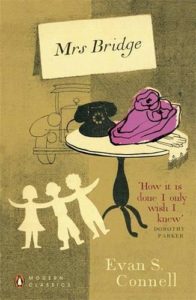 1950s: Mrs Bridge, the debut novel by American author Evan S. Connell, published in 1959. The novel, set between the two world wars is a searing exploration of suburban domesticity and marriage. Written in pared back language with brief chapters that seem like contemporary vignettes, Connell explores the prejudices and strait-laced morals of a middle class Kentucky housewife. Mrs Bridge’s failure to connect with her husband or her children, and her private anguish at not fulfilling her potential are described without judgement. Ten years later Connell published Mr. Bridge (1969), which relates the same story from the point of view of the husband.
1950s: Mrs Bridge, the debut novel by American author Evan S. Connell, published in 1959. The novel, set between the two world wars is a searing exploration of suburban domesticity and marriage. Written in pared back language with brief chapters that seem like contemporary vignettes, Connell explores the prejudices and strait-laced morals of a middle class Kentucky housewife. Mrs Bridge’s failure to connect with her husband or her children, and her private anguish at not fulfilling her potential are described without judgement. Ten years later Connell published Mr. Bridge (1969), which relates the same story from the point of view of the husband.
“some people go skimming over the years of existence to sink gently into a placid grave, ignorant of life to the last, without ever having been made to see all it may contain..’’
― Evan S. Connell, Mrs. Bridge
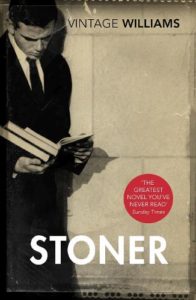 1960s: Stoner, written by another American writer, John Williams, sank into relative obscurity before being re-discovered some years back. The novel is set in a small campus town where Stoner, the eponymous main protagonist of the novel, overcomes his rural, impoverished roots to carve an academic career in a mid-league University. Stoner is quietly dignified in the pursuit of his love of literature and rises above the petty squabbling and rivalries of his colleagues. He marries badly, is estranged from his daughter, experiences love briefly in an extra marital affair and dies, unrecognised and yet his life feels like a Greek tragedy. It is a deeply melancholic novel.
1960s: Stoner, written by another American writer, John Williams, sank into relative obscurity before being re-discovered some years back. The novel is set in a small campus town where Stoner, the eponymous main protagonist of the novel, overcomes his rural, impoverished roots to carve an academic career in a mid-league University. Stoner is quietly dignified in the pursuit of his love of literature and rises above the petty squabbling and rivalries of his colleagues. He marries badly, is estranged from his daughter, experiences love briefly in an extra marital affair and dies, unrecognised and yet his life feels like a Greek tragedy. It is a deeply melancholic novel.
“You must remember what you are and what you have chosen to become, and the significance of what you are doing. There are wars and defeats and victories of the human race that are not military and that are not recorded in the annals of history.’’
_ John Williams, Stoner
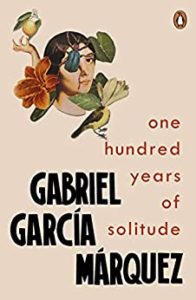 1970s: One Hundred Years of Solitude published in English in 1970. Written by the Colombian writer Gabriel García Márquez, it is a multi-generational novel about the Buendía family whose trials and tribulations echo the turbulent history of Latin America. The book is set in the mythical town of Macondo. Over the course of a century, Macondo is the scene of natural catastrophes, civil wars, and magical events; it is ultimately destroyed after the last Buendía is born with a pig’s tail, as prophesied by a manuscript that generations of Buendías tried to decipher. The book is an exciting blend of political satire with magic realism, fantasy and comic interludes.
1970s: One Hundred Years of Solitude published in English in 1970. Written by the Colombian writer Gabriel García Márquez, it is a multi-generational novel about the Buendía family whose trials and tribulations echo the turbulent history of Latin America. The book is set in the mythical town of Macondo. Over the course of a century, Macondo is the scene of natural catastrophes, civil wars, and magical events; it is ultimately destroyed after the last Buendía is born with a pig’s tail, as prophesied by a manuscript that generations of Buendías tried to decipher. The book is an exciting blend of political satire with magic realism, fantasy and comic interludes.
“…time was not passing…it was turning in a circle…”
― Gabriel García Márquez, One Hundred Years of Solitude
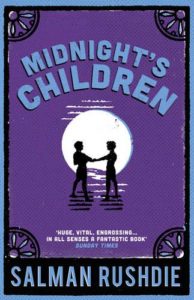 1980S: Midnight’s Children written by Salman Rushdie and published in 1981. The book is an allegorical novel set in post-colonial India centring on the inextricably linked fates of those who were born in 1947 within the first hour of independence from Great Britain. Saleem Sinai, the central protagonist, is a character with many unusual powers, especially a psychic connection to all the other children born as he was, at the very moment of modern India’s birth. Saleem’s life is a whirlwind of disasters and triumphs that mirror the course of modern India. The novel experiments with the English language, using Indian idioms and vernacular and combining socio-political critique of India with flashes of absurdist magic realism. It went on to win the Booker Prize in 1981 and the Booker of the Booker subsequently.
1980S: Midnight’s Children written by Salman Rushdie and published in 1981. The book is an allegorical novel set in post-colonial India centring on the inextricably linked fates of those who were born in 1947 within the first hour of independence from Great Britain. Saleem Sinai, the central protagonist, is a character with many unusual powers, especially a psychic connection to all the other children born as he was, at the very moment of modern India’s birth. Saleem’s life is a whirlwind of disasters and triumphs that mirror the course of modern India. The novel experiments with the English language, using Indian idioms and vernacular and combining socio-political critique of India with flashes of absurdist magic realism. It went on to win the Booker Prize in 1981 and the Booker of the Booker subsequently.
“I learned: the first lesson of my life: nobody can face the world with his eyes open all the time.”
― Salman Rushdie, Midnight’s Children
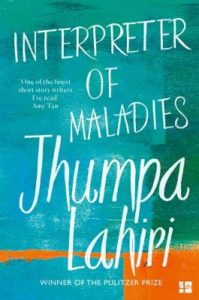 1990s: Interpreter of Maladies is a collection of nine short stories by the Indian/America author of Jhumpa Lahiri published in 1999. Awarded the Pulitzer Prize for fiction, these short stories explore the diasporic life of the Indian immigrant in America as they negotiate ways to assimilate and belong without letting go of the past. Lahiri writes eloquently about the immigrant experience and about the divide between cultures, examining both the difficulties and joys of assimilation. The title story describes an unlikely rapport between an Indian tour guide and an American born Indian woman who is visiting India as a tourist. Each story is a sensitive exploration of loneliness, isolation and loss, set during the Seventies and Eighties- a period when India and Indians were still regarded as ‘exotic’ by mainstream America.
1990s: Interpreter of Maladies is a collection of nine short stories by the Indian/America author of Jhumpa Lahiri published in 1999. Awarded the Pulitzer Prize for fiction, these short stories explore the diasporic life of the Indian immigrant in America as they negotiate ways to assimilate and belong without letting go of the past. Lahiri writes eloquently about the immigrant experience and about the divide between cultures, examining both the difficulties and joys of assimilation. The title story describes an unlikely rapport between an Indian tour guide and an American born Indian woman who is visiting India as a tourist. Each story is a sensitive exploration of loneliness, isolation and loss, set during the Seventies and Eighties- a period when India and Indians were still regarded as ‘exotic’ by mainstream America.
“Still, there are times I am bewildered by each mile I have travelled, each meal I have eaten, each person I have known, each room in which I have slept. ‘’
― Jhumpa Lahiri, Interpreter of Maladies
I love the sound of Mrs Bridge, particularly in light of the author returning to the story to revisit from a second viewpoint. I’d like to thank Reshma for these brilliant recommendations – discovering new authors, not previously on my radar, has been one of my favourite parts of the Decades Library.
The prospect of someone discovering new books to love keeps this feature running week after week. Before I even publish this post I have achieved my goal – I have made a purchase this morning.
DECADES WILL RETURN